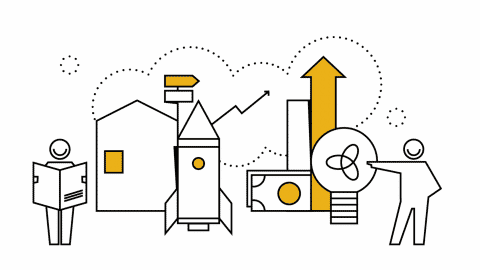
crowdfunding.de: There are so many different crowdfunding platforms on the market. What makes Indiegogo special?
Liz Wald: There are 3 things we would like to think about with Indiegogo. One is we are global, you can be from just about anywhere in the world and launch a campaign. The site is available in 4 languages and 5 currencies. Another thing is that we are open, we do not have an application process. We do have some rules, you cannot raise fund to drive a tank down Leipzigerstrasse or something (laughing)… But for the most part, if it is not illegal you can do it on Indiegogo! And the third thing is flexible. Indiegogo has flexible funding as well as fixed funding. Flexible funding gives people a chance to still take home contributions, even if they do not hit the goal.
We want to be part of the community, part of the grassroot ecosystem in Berlin and other places around the world. Our customer support team, called the customer happiness team is based in San Francisco but we have French, German, Russian, and Spanish speakers on that team. Also, we want to provide as much data and information as possible so people can be successful. Other platforms give you some information for free, but charge for the help. We don’t think you should be charged for the help. Soon we will have a person in Berlin who can host workshops, give examples of good campaigns and invite campaigners to tell their stories. These things will help make Indiegogo part of the community.
Indiegogo received a funding of $40M. USD, what are your plans for the future?
Today Indiegogo is a 85 person company. If you want to be the global leader, you need to invest in more people, more locations and a more global product platform including mobile. A lot of our investment will go towards general and global expansion. We also want to add additional payment options. Many things require more people, more energy and more time and all of these things cost money. So the $40M is really going to the global growth of the company.
And what are the main countries you are focusing on?
We basically started with the English-speaking countries and then the next move is really Europe. If you are talking about Europe and commerce and internet, you start pretty much with the UK, Germany and France as the biggest markets. And than you look at the Scandinavian and the southern European markets. I think Europe as a whole is a huge market and as big or even bigger than the US when taken together. So it makes a lot of sense for us to focus on this region. But the world is a big place, there are a lot of people, we have campaigns from all over the world. One month we have a great Romanian campaign, than the next month we have a big campaign from Israel and the next month there will be something from Korea or elsewhere.
Do you already have some insights about cultural differences related to crowdfunding?
It is interesting, because there are several countries in Europe for whom equity-crowdfunding is already happening. We see it in the UK, in the NL, we see it here and we see it in other places. But I think with equity crowdfunding there is an expectation of a certain type of business or certain size or certain opportunity, because you are investing for a financial return. And with contribution- or reward-based crowdfunding your motivations for contributing are very different. You can see differences in countries that have had for example a long history of arts funding from the government, in the US we have not had this. In Canada they have a Canadian film institute that historically has helped to fund films. So getting people’s mindset around the fact that those funds are not there anymore and now individuals have to do it takes some time. Even for two countries that are culturally similar, there are big differences even between Canada and the US. I think when you come to Europe you have some of those things where maybe certain kinds of charities or certain kinds of arts have been funded more traditionally and now you have to get the mind shift. At the same time I think if you are at place like Berlin, you have huge art and creative culture. So the idea that somebody could just launch something and not have go to bank is amazing and people are really excited to do it.
I am not sure to what extent it makes sense to distinguish strictly between investment and reward-based crowdfunding. By combining both aspects you can really leverage the power of crowdfunding.
When you look at something like Panono that is a product that has a significant cost to make. If they do it well you can imagine the next product and the next product. Crowdfunding, in this sense contribution-crowdfunding, could be step one before equity-crowdfunding comes in. Sometimes we see that it’s replacing a Series A. I mean they raised $1.25M, that could easily have been a Series A investment. So I don’t think it is all or nothing, but if somebody is to trying raise $10,000 to make a coffeetable book, that’s not going become a business that needs equity. Sometimes I am contributing because I want the perk, sometimes I am contributing because I want a return and sometimes I am contributing because I always wanted to be a photographer, or this is my friend, or I am passionate about the subject. We are only at the beginning or early days of crowdfunding. I think we will see many, many models coming.
Let’s get back to the $40M funding of Indiegogo. If Indiegogo believes in crowdfunding, why didn’t you apply crowdfunding to finance the expansion of Indiegogo?
There are some regulatory challenges raising your money on your own platform for the platform itself but it’s also quite a bit of money! We don’t yet have equity crowdfunding on Indiegogo – maybe someday we will when it is open for everyone and not just certain types of investors. Within the company we have done some some campaigns on a smaller basis. Like for example the NY office crowdfunded a dart board from other employee contributions.
I just think that applying crowdfunding to Indiegogo would really streghten your base. Also as a competitive advantage.
Sure, who is to say that this would not happen in the future. Today, I think it was probably not the right thing for us.
Let’s talk about the future of crowdfunding. Where do you see crowdfunding in 5 years?
I think the first answer is everywhere. Crowdfunding has really only been around a few years, it is fairly new. I think that we are going to see more people and more institutions thinking about crowdfunding as another slice of the finance pie. You have credit cards, you have bank loans, you have venture capital, you have micro loans and all this kind of things. I think you could imagine that even potentially banks offer their customers services related to crowdfunding. We are going to see it more and more in different elements of our lives. Kind of the way e-commerce has seeped into everything. Like AirBnB and Uber, there are marketplaces, commerce and transactions that did not happen 5 years ago. And I think we will see the same kind of think with crowdfunding.
I saw recently a crowdfunding application at the webpage of an agency that is offering trips to Asia. They enable their customer to raise money via crowdfunding for the trip directly at their page.
There was an article recently about job boards. It would be interesting as part of your profile, whether you are on LinkedIn or a career page. People can show: These are campaigns I have run, these areas in which I had successful campaigns, this is a way to show my entrepreneurial skill or that I can generate capital. We will see, what do you think?
I also think that crowdfunding will grow and expand to different aspects of life. I am just a bit afraid about the fraud in crowdfunding.
Well in the regulated world of finance we have cases like Enron. We have fraud and cheating where you have regulators and publicly traded companies. But it does not take the whole industry down. So you have bad actors in everything. In crowdfunding you have not only to put everything you have out to the whole world to look at. But you also are taking your entire social capital, everyone you have ever met, saying please fund me. And if you cut all these people off, it is a disaster. So at Indiegogo we have a team and algorithms that look for suspicious activities. But at the end of the day what you really have is millions of people looking at this stuff all the time and saying “that does not seem right” or “I know this guy and he is a bad person.” That I think makes it almost harder to take advantage of people when it’s so public for all to see.
Probably there will also appear business solutions that are related to crowdfunding?
Yes, I think there will be a whole ecosystem. There will be manufacturing, fulfilment, marketing, PR. Panono for example had a PR firm. There already are crowdfunding consultants who say “I will guarantee you that I can bring a certain amount of additional dollars, but you have to give me a specific share.” I think you will see a lot of that, similar to the way that people support ebay sellers or amazon sellers. There is fulfillment, there is labelling, there is shipment, all these industries came up to support that. I think we will see the same thing, for sure.
What is for you “The Beauty of Crowdfunding”?
Before this job I worked at Etsy. And before Etsy, I worked with my own company helping women in Africa get their products to market. I wanted to try to build a company that was a for-profit social enterprise and one of the biggest problems was the capital. If you do fair-trade you pay half upfront, to enable the people who are making the product to buy materials. After production you pay them the other half, what is supposed to be their profit. In normal business you pay 30 days after they deliver, you do not pay upfront anything. There is so little access to capital in these markets. If you have a little restaurant and want to expand it, no-one is giving you that loan. I think crowdfunding in local economies over time has huge potential. Because everyone in this markets has some amount of money, but they have no way to pool all this together and make a loan and make a return. Ultimately crowdfunding can unlock all this capital. That is where I think it is really amazingly interesting. And for people like doing things like Panono, it is a way to test your markets and see if there is a demand and to test pricing and get feedback. And it is a way to get money without giving away equity, so it is pretty awesome. But they probably would have more of a chance to raise that money in a traditional way than the person that has a restaurant in Kenia. I think that is where it is really super interesting. I could have really used that 10 years ago.
Thank you Liz!
Das Interview mit Liz Wald wurde am 11.03.2014 in Berlin geführt.






Kommentare
Die E-Mail-Adresse wird nicht veröffentlicht. Erforderliche Felder sind mit * markiert. Infos zum Datenschutz.